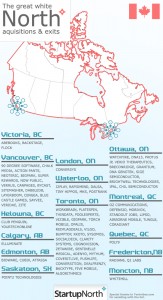Editor’s note: This is a guest post by Alyssa Richard (@AlyssaJRichard), Founder of RateHub, a Canadian mortgage rate comparison engine. While StartupNorth is focused on Canadian startups, with Winter on the horizon we thought some readers would enjoy hearing that our cousins in the Southern Hemisphere are building a thriving tech ecosystem.
The garage enjoys a special place in the mythology of tech entrepreneurs. It’s where Steve Jobs, Bill Gates, and many other aspiring techies launched their first ventures. Whether it’s your garage, living room, or home office, I’m sure you founders out there will agree that startups are usually launched close to home. It’s where we’re most comfortable, have built strong connections, and, yes, it’s a way to reduce pressure on already burdened finances. Bolder souls might opt to move closer to cash and talent pools, such as Silicon Valley, and some even make the journey overseas to be closer to manufacturing. But with cold days and dark mornings closing in, I’m tempted to consider one final factor: climate.
The inspiration for this post comes from a recent trip to Australia, where I judged Univation 2011, a business competition for students and alumni of universities in Western Australia. The total prize pool was over $200,000 AUD. During my stay, I had the opportunity to meet many talented entrepreneurs in both Sydney and Perth. Suffice to say I fell as much in love with the startup scene as I did the beautiful beaches.
Here are some of the startups I met:
 Shoes of Prey is a website that allows users to design their very own custom women’s shoes. From booties to stilettos, satin to sparkles, users can release their inner fashionista and wear the results within just a few short weeks.
Shoes of Prey is a website that allows users to design their very own custom women’s shoes. From booties to stilettos, satin to sparkles, users can release their inner fashionista and wear the results within just a few short weeks.
Unique Aussie Benefit: Close to Manufacturing
Shoes of Prey’s proximity to China allows this largely Sydney-based business to travel from its headquarters to its manufacturing plants in 8 hours or less. No need for a 24 hour flight. Since both countries are located in the eastern hemisphere, there is only a 2 hour time change which makes communication and working together incredibly simple.
Unique Technology: 3D model shoe design
Bringing the customizable fashion trend (think TailorYou.com) to the shoe industry was no small “feet”. While the manufacturing industry has been set up to handle customizable items like shirts and suits, shoes presented a new challenge as a less experienced vertical. The young company has also overcome a major technological hurdle: the site was originally launched with a 2D shoe model, but found that customers were having trouble picturing the beauty of these $280 shoes in full. This week they’ve launched their new and vastly improved 3D shoe model after 6+ months of hard work.
Funding Stage: Bootstrapped and raising
Shoes of Prey has been bootstrapped to date with a $300,000 investment from its three co-founders but the company is currently in the process of raising $2M. With their impressive mix of technological and manufacturing expertise and 5,000 pairs of shoes sold, I don’t imagine they’ll have much trouble.
 Fusion Books is an online yearbook system that makes building school yearbooks easy. Bootstrapped by co-founders Melanie Perkins (23) and Cliff Obrechet (25), Fusion Books now services hundreds of schools throughout Australia and will be licensing their yearbook system internationally in the coming months.
Fusion Books is an online yearbook system that makes building school yearbooks easy. Bootstrapped by co-founders Melanie Perkins (23) and Cliff Obrechet (25), Fusion Books now services hundreds of schools throughout Australia and will be licensing their yearbook system internationally in the coming months.
Unique Aussie Benefit: Underserved local market
While the yearbook industry has some major players in the North American market, such as Jostens, Melanie and Cliff are on their way to a significant share of the Australian market through superior technology and an incredible team on the ground taking the Aussie market by storm.
Unique Technology: Accessibility and ease of use
Melanie and Cliff launched Fusion Books because too many schools and businesses were wasting hours with complicated technology like Adobe Indesign and Photoshop. Worst of all these programs could only be accessed on one computer, allowing limited opportunities for collaboration. While their technology, designed by Melanie at the age of 19, is as easy as pie to use, don’t underestimate the coding. For example, editors can set up basic profile questions that students answer through an e-mailed URL, and crowd-sourced content is uploaded and formatted automatically for all students.
Funding Stage: Bootstrapped, cash flow positive
In a world where venture-funded startups attract a lot of attention, I was very impressed with this dynamic duo who have built and own 100% of a profitable business.
 Posse is a social platform that leverages a brand’s most dedicated customers to help spread the word online. A brand’s customers, or “fans,” are given exclusive product/service offerings that they can share with friends to receive prizes in the form of cash and products. Posse captures the viral aspect of sharing deals online but allows brands to control the deal.
Posse is a social platform that leverages a brand’s most dedicated customers to help spread the word online. A brand’s customers, or “fans,” are given exclusive product/service offerings that they can share with friends to receive prizes in the form of cash and products. Posse captures the viral aspect of sharing deals online but allows brands to control the deal.
Unique Technology: QR codes track offline activity
It’s easy to see how a platform could be set-up for customers and fans to redeem pre-purchased vouchers, but Posse takes this one step further. Fans of a brand can share exclusive deals with their friends, through a voucher containing a unique QR code. When the friend goes to redeem the product, say a haircut, the business scans the QR code, collects payment and enters in the gross sales associated with the service. The original brand fan can now be awarded for their friend’s sale through a combination of deals and points. Essentially Posse has created a trackable affiliate program where companies/brands are in the driver’s seat.
Funding Stage: Seed, en route to Series A
With two rounds of funding under their belt, the company has built a platform, acquired users to test and refine the service, and will eventually raise additional funding. With this company’s unique spin on the group deals space, it’s no surprise angels have gotten so excited.
 As the winter chill sets in, just remember you have options. With all the activity in Australia, I highly recommend exploring startup life down under, where technology and business have a home by the beach.
As the winter chill sets in, just remember you have options. With all the activity in Australia, I highly recommend exploring startup life down under, where technology and business have a home by the beach.
Top left: Beach in Margaret River with fellow judges including Bill Tai of Charles River Ventures
Top right: Kitesurfing with Dan Larsen of Qualcomm
Bottom left: Meeting with co-founders of Shoes of Prey in their Sydney office
Bottom right: With the winners of the Mobile App contest, the brilliant minds behind Big Help Mob



















 As the winter chill sets in, just remember you have options. With all the activity in Australia, I highly recommend exploring startup life down under, where technology and business have a home by the beach.
As the winter chill sets in, just remember you have options. With all the activity in Australia, I highly recommend exploring startup life down under, where technology and business have a home by the beach.